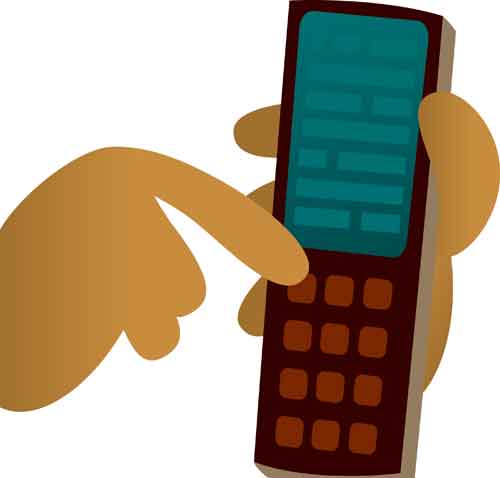|
Nielsen Media, a global market research company, reported in March that spending on voice calls has gone down significantly over the last five years, while customers' text spending is increasing. It's anticipated that texting will eclipse voice calls totally in three years. Rahma Karam, a Moroccan matriculating at the Huazhong University of Science and Technology in Wuhan City, Hubei Province, and Zhang Wen, a student at Capital Normal University in Beijing discuss whether their own phone habits are falling in line with this trend.

Cellular Socializing
by Rahma Karam
My first cellphone was a gift from my mother. I was in ninth grade, surrounded by plenty of classmates who were already sporting colorful, small, shiny mobile devices.
My phone, however, wasn't shiny and colorful. It was quite basic. I was still part of the school's large circle of cellphone owners, though, and spent nights sharing jokes, poems and horoscopes. I typed text messages while staring at teachers. I don't recall wasting too many minutes on voice calls, mostly due to the fact that our neighborhood teleboutiques (public phone booths) were cheap, reliable havens for gossip.
My social life was, in sum, a pile of text messages from friends and classmates and nocturnal "beeps" from unknown numbers. "Beeps" are the very irritating habit of dialing a number and hanging up before the recipient answers. In many African countries "beeping" became an efficient way to elicit a call when running out of credit. It eventually evolved into a complex courtship where your quantity of "beeps" was irrefutable proof of a flourishing social life.
Years later, I came to Beijing to study Mandarin. I was pleasantly surprised by how 50 yuan ($7.6) of credit lasted longer than 50 dirham ($6.3) of credit. I found myself phoning my mother all the time. I was impressed by the state of Chinese cellphone networks, and began using and abusing voice calls. I still used text messages on a daily basis, though. The only difference was that the circle of friends I texted had shrunk, and texting was no longer as thrilling as it used to be.
Nowadays, my cellphone is usually stuck to my ear. My calls last for only about 30 seconds, though, because they are to family and very close friends who can either call back or meet me right away.
A voice call means I have to forgo all distractions, I have to concentrate entirely on the call until it's done. In my mind, they are the foundation of telecommunications. They're the easiest way to get hold of a family member or an office, or to bug friends living in other cities. I am not saying I consider texting the bane of telecommunications. I still remember fondly how often text messages made me burst out laughing or break down in tears. They're cheap, they can prove innocence or provide evidence, and there's always space to store at least 40 of them.

The Thumb Generation
by Zhang Wen
I got my first cellphone when I entered university in 2007. At the time, most numbers on my contact list were family members and classmates. Although I received only a few messages a day, every time I heard the ringing sound of an incoming text, I felt like I was getting a long-awaited surprise.
Talking on the phone is a love-hate thing for me. I love it when I can find a quiet place to call my friends without being overheard or interrupted. And it's good to talk with my parents when I'm far away from home. When I volunteered with an internship program in Abuja, Nigeria, I regularly called my parents. Though I was charged as high as around 7 yuan ($1.07) per minute, I felt love and warmth hearing their voices far away in China.
However, I hate losing reception on the subway, and an exciting conversation becomes your own monologue. Or you're watching television program, and your supervisor calls right at the drama's critical moment. The impact mobile phone radiation has on human health also shouldn't be ignored. Cellphones produce their maximum loads of radiation when a voice call is made but not connected. In contrast, text messaging doesn't pose the same health risk.
To some extent, economically, texting has long won the battle over voice calls. According to China Mobile Research Institute statistics, by September 2005, China Mobile's phone subscribers sent on average 700 million text messages every day, and this figure is increasing every year. No wonder Chinese young people are being called the "thumb generation."
Text messaging has changed the Chinese way of life. During the Spring Festival, "Happy Chinese New Year" greeting messages are sent between friends. This year when the New Year bell struck zero, the ringing sound of messages kept on singing "Wishing you all the best in the Year of the Rabbit!" I appreciated these messages and believe that texting greetings has gradually become an integral part of Chinese New Year customs.
In my view, it's inevitable that texting will eclipse voice calls. Chinese telecom operators have already launched different short messaging service (SMS) packages, catering to customers' diversified demands. This, in turn, speeds up the development of SMS market. I believe in the near future, China's image as a "bicycle kingdom" will be replaced by a "short message kingdom."
|